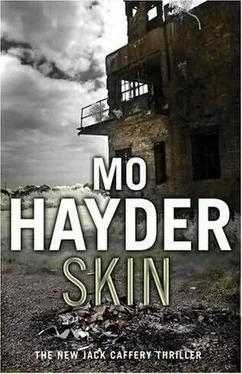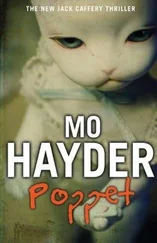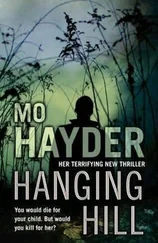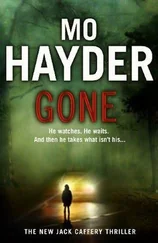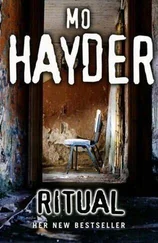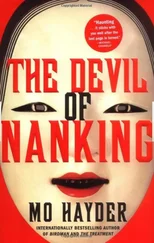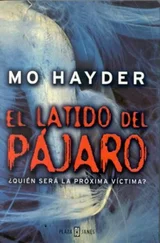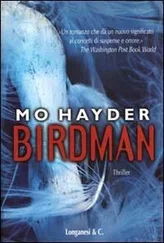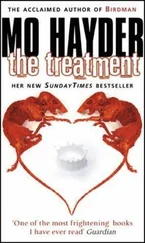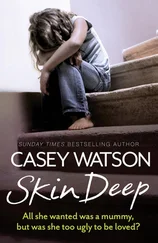He clung to the ladder, breathing hard. Most inspection-chamber covers like this rusted up and needed a sledgehammer to open them, but this was the only way into the cesspit. It was the only way Gerber could have got him down here so it must have been opened recently. He ran his hands around it, trying to work out the secret. He found a lump – a triangular piece of metal, the apex of the triangle at the dead centre of the lock. This was the sort of cover that locked with a slip bolt. Ordinarily the mechanism would be underneath, but Gerber had inverted the cover and locked it from above. The bastard. There was no way anyone down here could release the lock without tools.
He disentangled his leg, came down the ladder and felt around underfoot. The floor was an uneven mix of unfinished sharpstone and ballast, covered with a hardened layer of grease and toilet paper. Moss and a few weeds were growing in it, making it smooth to the touch. He let his fingers skim the surface and found a couple of rusting old bolts, a food wrapper of some sort, blown in here maybe when the pit was decommissioned. And a long slim tube. Hard plastic or Perspex. It was wider than a needle but slimmer than a rose stem.
A Perspex tube?
He found another one. And another. They were gathered in the place he’d been lying. Clinking together like wind chimes. He sat down and held his wrist canted over so the dim fluorescent green of his watch face illuminated them. The ends were dark and sticky with blood. He turned them over and over, trying to guess their function. The blood was fresh. Still tacky. His blood. Had to be. But why?
He rested the tubes against the wall in the corner, where he’d be able to find them again, stood and gave the baffle pipe at the edge of the pit a sharp thump with the heel of his hand. There was a faint sound of rust flakes falling to the floor, a creak of old metal, but the pipe was solid. It had been set into the mortar of the bricks and nothing short of a sledgehammer would move it. He turned to the ladder and tugged at that. Again, solid. It was designed to hold the weight of a man and there was no way he’d be able to pull it off. He gave in to a moment’s anger and booted it. Something soft gave in the back of his leg. He felt the wound reopen, begin to leak.
He bent over and locked his hand around his calf. The pain was so bad his teeth felt metallic, but he kept his head up and back. Couldn’t afford to faint.
When he’d got hold of himself he examined his leg. He took his hand away, and as he did, a strip of flesh about the width of a piece of tape flopped from the top of his calf almost to his ankle. It was still attached at the bottom where it hung like a piece of stripped bark, twisted inside out so the fleshy underneath was open to the air. Bits of brick dust, wood and things he didn’t want to give much thought to clung to the flesh. Blood came out new and warm, soaking into his socks.
He tore off a strip of trouser leg and used his teeth to rip it in half. Clumsily he pressed the strip of flesh back into the wound hole, smoothing it into place. The debris would have to be cleaned out later. For now it was enough to stop the bleeding. He wrapped the trouser material around his calf, laying his leg back hard on the floor to get the pressure, and, wincing at the pain, tied the material against his shinbone. The blood pumped on for a few seconds, trickling through his fingers. Then it slowed until it was just running out of the edges of the wound.
He thought of the spots on Gerber’s tunic. Lucy and Susan would have bled a lot. He wondered what their last thoughts had been. He recalled their wrists. The way Gerber had sliced them. Up and down. Not left to right.
And then he got it. He let out all his breath and slumped back against the wall. He’d just figured out what the Perspex tubes were. And it wasn’t good. Not good at all.
It meant Gerber would be back before long.
Flea’s team were trained in MOE – method-of-entry techniques. A smart name for the time-honoured skill of kicking in doors, except that when the police did it, it was with specialist equipment and the blessing of the law. The unit went back each year for a day’s requalification training. The last session had been only a month ago and Flea knew that the forced-entry tool-bag – which Wellard called the Bag of Bollocks – was still to hand in the office.
She drove back fast, using roads the traffic units didn’t bother with, grabbed the bag and the heavy cylinder of the thermal lance the team used to cut through metal, put them both in the car and headed back towards Farleigh Park Hall. She didn’t have very long.
She was pissed off with herself. It was brainless to have dealt directly with Ruth Lindermilk. She shouldn’t have tinkered around. She should have treated her like an object, should have got in there, taken the first opportunity she had, kicked the door down and grabbed the photo of Thom. Time had just been slipping out of her hands. And all the time Misty had been decomposing.
She parked further up the road, careful not to go anywhere near the body-recovery scene. There might still be police there. Hiking the bag on her shoulder, she headed up through the undergrowth.
As always the hamlet was hushed – deserted. It was only the one or two cars parked down the lane that told her anyone was at home. Someone somewhere was watching sport – she could hear crowds cheering as she passed a window. At the bungalow she took a moment to go to the top of the garden and peer out over the wall, just to satisfy herself that no one was watching, then went to the back of the house and set to work.
First she tried all the doors and windows: no point pulling out the heavy artillery if Ruth had simply left a door unlocked. Everything was tightly closed, about what you’d expect with Ruth’s paranoia. The bungalow had quarter-lights in the lower windows, which were small and easy to break. She went to the kitchen ones and studied them. If she remembered rightly the sink and the dishwasher were under them. She recalled a butler sink. Solid. It would hold her weight.
She pulled on gloves and fumbled in the bag, past all the big equipment, for the smallest in the arsenal of tools: the tiny spring-loaded centre punch. They called it the Glasgow key. It took no effort at all, and now she gave just the smallest of taps against the pane. A sharp crack and a spider-web break zigged out into the float glass. It was the tiniest sound, but even so she held her breath and checked over her shoulder. The garden stood motionless – not a breath of air, not a sound of wildlife moving, only the distant hum of the television in the still air.
Tongue between her teeth she pulled out the pieces of glass, cleaning off the edges with a cloth. The last thing she needed was blood, forensic evidence that would link her to this break-in. When it was clean she pulled her sweatshirt sleeve all the way down over her hand and pushed her arm inside, feeling for the latch. She found it, tugged at it. It was locked, so, groping around, she found the other. That was locked too, with no key in it. She stood back, swearing to herself. It’d have to be the little wrecking bar, then. This time it worked like a dream. It fitted perfectly under the locks. The first came out after two or three wrenches and the second with no effort at all, splinters scattering everywhere.
Very carefully she opened the window and lifted the bag of tools through it. The curtains were closed as usual and when she peeped through there were no lights on, only the illumination of the green light on the boiler and the little pilot flame flickering blue. She could smell cats and food, lasagne or something – maybe what Ruth had eaten last night. Did she know, as she put the food into the microwave, that it was the last thing she’d ever eat in her life? It didn’t feel right, this suicide. Not at all right. Yesterday on the phone Ruth had sounded fine. Happy, even.
Читать дальше
